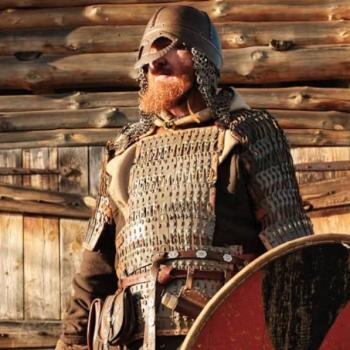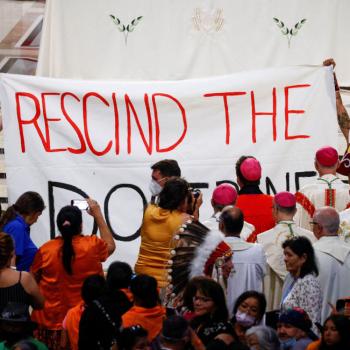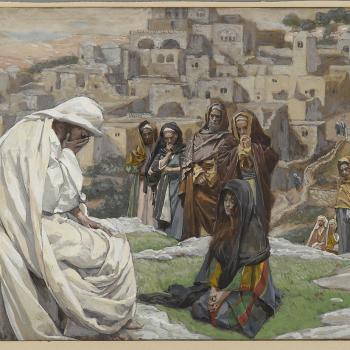
In Parables as Subversive Speech William Herzog takes us back to the time and place in which Jesus lived for a fresh reading of nine of Jesus’ parables. (See numbers 3-11 in the list below.) We find Jesus in the midst of the economic, political, and religious forces that oppressed Palestine’s poor people. In parables Jesus draws word pictures of the ways that oppression works and encourages creative thinking in response. Jesus’ parables, in this view, are not so much lessons about morality or even the Kingdom of God as they are discussion starters.
This is the last post in a series on Parables as Subversive Speech. Previous posts in the series:
- William Herzog Reads Jesus’ Parables, Brings them Down to Earth
- Paulo Freire, the “Pedagogue of the Oppressed”: Is This a Good Fit for Jesus?
- Laborers in the Vineyard: A Reading that Doesn’t Blame the Victims
- The Parable of the Wicked Tenants and the Wickeder Landlord
- The Rich Man and Lazarus, or an Oppressor who Won’t be Taught
- The Unmerciful Servant Parable Trashes Messianic Hopes
- The Horrifying – or Tragic – Parable of the Talents
- Publican and Pharisee: A Parable of Two Public Sinners
- The Friend at Midnight – Shameless, but in a Good Way
- Unjust Judge Out-Shamed by Persistent Widow – a Parable
- A Dishonest Steward Uses the Weapons of the Weak
Herzog vs. Traditional interpretations of the parables
Herzog relies on a century of scholarly work separating Jesus’ actual words from their biblical setting. That done, he proposes that the original parables were not earthy stories teaching abstract moral and theological truths. That’s the traditional, spiritualizing interpretation that started with the evangelists. But for Jesus’ listeners among the poor of Palestine the stories would have focused their attention directly on the material conditions affecting their lives. These factors included oppressive economic, political, and religious forces as well as the culture of resistance that a poor population invents for its survival. A later generation would use Jesus’ stories to foster the values of the Kingdom of Heaven. But Jesus must have meant what his original hearers would have heard and understood.
Jesus did more than tell the poor of Palestine what they already knew. His stories, with their odd twists and often surprising outcomes, guaranteed that a lively conversation would ensue. That conversation is lost to us, but Herzog sees Jesus’ purpose precisely there. That purpose lay in the awakening of new perceptions that fierce debating would have promoted. Social scientists have found that oppressed peoples often take on the worldview and self-justifying myths of their oppressors. Jesus told stories where those ideologies lose their strong hold or fall apart completely. They gave village peasants and day laborers freedom to create new visions for themselves while discovering new value in their own traditions.
The God problem in Parables as Subversive Speech
Traditional interpretations of the parables work most often by finding in them a character that represents God. Of the nine parables Herzog features, only two do not have a God figure—The Rich Man and Lazarus and The Publican and the Pharisee. One parable, The Friend at Midnight, has an unsavory God figure who grumbles about having to get up to help his neighbor. The Unjust Judge, in another parable, is a God figure whom the story itself calls evil. The other six all have supposed God figures whom the poor among Jesus’ listeners would have disliked. They were rich and part of the oppressive establishment. To us these characters might seem neutral or good , but that’s only until we understand their roles in the Palestinian economy. Herzog, I think rightly, doubts that Jesus’ listeners would have seen God in any of these “God figures.”
With God no longer in the parables – at least these nine – some have wondered how Herzog sees Jesus. He seems more social justice activist than herald of the Kingdom of God. This is a criticism that Herzog acknowledges in a second book, Jesus, Justice, and the Reign of God. In that book, Bruce Malina says,
William Herzog bridges the gap between purely historical and theological interpretations of the life of Jesus with a compelling synthesis of politics and theology, faith and history. (Back cover of the book)
The incarnation is key.
Herzog does not compromise with the sentiment that Jesus must stand above politics. In his conclusion to Parables as Subversive Speech, he says
… justice was at the center of Jesus’ spirituality. It is a conceit of the North American church that Jesus was not involved in politics and economics but limited himself to spiritual matters…. Jesus’ proclamation of the reign of God, including its attendant theology and ethics, grew out of his social analysis. He did not proclaim the reign of God in a vacuum or teach theology and ethics devoid of social context.
Jesus, God incarnate, lived a fully human life. That is a Catholic doctrine often limited to only part of what being human means. Applied to only an individualistic Jesus, the incarnation loses much of its meaning. The political, economic, and social (including religious) context in which Jesus grew up became part of him. Jesus, a public figure in early first-century Palestine, could not have avoided politics. The economic conditions of the poor show up in many of his sayings. He could not help but object when Jewish leaders twisted the Scriptures and temple observance to favor the rich over the poor. Jesus had a penetrating analysis of the material conditions oppressing the poor of Palestine, and his spirituality never left that behind.
A worldly, material spirituality informs many of my posts on this platform. William Herzog adds clarity and encouragement to that theme. I look forward to writing about Herzog’s Jesus, Justice, and the Reign of God next.
Image Credit: Red Letter Christians












